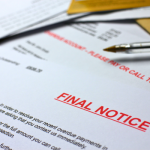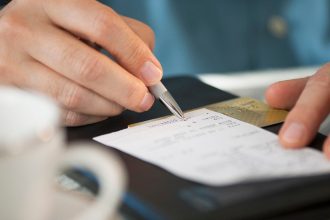Key takeaways
- Overpaying your credit card bill is a common mistake that usually has no negative affect on your credit card account.
- If you’ve overpaid by a significant amount, however, then the action can trigger a fraud warning with your issuer.
- If you’ve overpaid your bill, you can either request a refund from your issuer or just let the negative balance roll over to your next credit card bill.
Even if you pore over your credit card bills and pay them diligently every month, mistakes can still happen. You could hit the wrong key while paying your credit card balances online or forget to factor in a pending refund, leading to overpaying your credit card bill. You might also decide to pay off your balance manually before your scheduled automatic payment and overpay that way.
Paying more than what’s due on your credit card bills won’t negatively affect your account, and you won’t lose the money. But there are a few things that could go wrong if you overpay. Here’s what to keep in mind when you accidentally overpay and what you can do about it:
What to know when you accidentally overpay your credit card bill
If you’ve accidentally overpaid your bill, this information can help you understand what to look out for:
Your overpayment may trigger a fraud alert
Overpaying your credit card bill by a small sum will result in a negative balance on your account, but usually nothing more. However, overpaying by a significant amount may be a fraud trigger for your issuer.
Sometimes overpayment of large sums can be the result of mistakenly adding an extra zero to your payment. But it is also a potential sign of refund fraud or even money laundering. Overpaying by a large amount may cause your issuer to freeze your account while investigating the issue or even close your account altogether, which could impact your credit score.
You can generally resolve an overpayment issue by calling your issuer and explaining the mistake. Once you verify your identity as the primary cardholder and explain the error, your card should be reactivated or your account restored.
Your overpayment won’t boost your credit score or credit limit
If you’ve overpaid your bill by a small amount, you shouldn’t see any negative effects on your account. But you shouldn’t expect a special credit boost, either. Your credit utilization ratio will go down — which can positively impact your credit score — but no more than it would for a standard in-full payment.
It also won’t change your overall credit limit. If you need a higher limit on your credit card, consider checking out our picks for the best high-limit credit cards.
Your overpayment won’t cancel out any missed or late payments
Overpaying your bill won’t make up for any past missed or late payments. Those missed or late payments are already part of your credit history, so overpaying won’t make them go away. But, paying your bills in full and on-time will eventually cause your credit history to become positive again.
You won’t accrue interest on a negative balance
Interest applies only to balances you owe, and if your account is negative, then you owe $0 and actually have a credit on your account that will apply to your next bill. This means that no interest will accrue on your balance since it’s below $0.
Steps you can take after overpaying your credit card
Overpaying on your credit account will lead you to two options: letting the negative balance roll over to next month’s bill or requesting a refund.
1. Leave the negative balance to roll over next month
Generally, your overpayment will appear as a credit in the form of a negative balance on your account.
This negative balance will roll over towards any new charges you make or outstanding balances for the next month. For example, if you had a negative balance of -$100 and spent $200 on your card the following month, you’d only owe your card issuer $100. So, if you continue making purchases with your card like normal, your overpayment should be resolved without any further action.
If you don’t use the negative balance within six months, your creditor has a legal obligation to try to issue a refund. But if your card issuer can’t contact you because you’ve moved or changed your phone number, you may not receive that refund.
2. Request a refund
If you would prefer to have your money returned by your issuer, you can request for a refund. Many credit card issuers also allow refund requests by phone or through your online account, but you might have to make a written request, instead.
It’s important to note that it is up to the issuer’s discretion how they would like to respond when you request a refund. Contact your issuer and try requesting a refund for the amount of the negative balance, which will be what you paid minus what you owed on your credit card statement. If you only meant to pay the minimum due and want a refund for the rest, you can request that as well, but be prepared to pay interest on whatever balance you still have.
Federal regulation requires creditors to follow up within seven business days of receiving the request. Your refund may come in the form of cash, check, money order or direct deposit to a registered bank account. Take note of when you should expect your refund, and follow up with your issuer if you don’t receive it by that date, to ensure the refund was processed correctly.
How to avoid overpayments
Credit card overpayments can be more of a hassle than anything else because they may disrupt your cash flow for a period of time. However, you can keep a few things in mind when you’re going through your bills for the month in order to stay organized, such as the following:
Set up autopay
One way to avoid overpaying in the future is by enabling autopay on your credit card bill. Many of today’s top credit cards offer this feature, which allows you to set up an automatic payment from an account of your choice to pay your bill.
You can set the autopay to pay the bill in full, pay a fixed amount or pay the minimum balance due — although if you don’t pay in full, that would mean carrying a balance on your credit card, which would lead to interest charges. You may also determine the date you’d like the payment to process each month. Log into your online account or mobile app to see your card’s specific autopay options.
Check over your recent transactions and sign up for alerts
To avoid overpaying, you should check your account balance and payment schedule regularly, as well as sign up for alerts so that you’re notified when the due date is approaching. This will also allow you to double-check any pending transactions before you due date. If you plan to make an extra payment during a billing cycle, staying aware of your account activity can help you avoid overpaying and reduce the risk of late or missed payments.
Talk to your issuer as soon as you notice the overpayment
If you do find yourself in a situation where you overpaid your balance, try to catch it while your payment is still pending. This way, you can work with your issuer on the possibility of canceling the payment before it processes.
The bottom line
Overpayments happen, so don’t panic. You have options. Whether you decide to let the negative balance roll over and get credited to your next bill or to request a refund, you shouldn’t see any negative effects from doing so. Overpaying your credit card balance and carrying a negative balance also won’t hurt your credit score — but it won’t help it in any special way, either.
Read the full article here
















